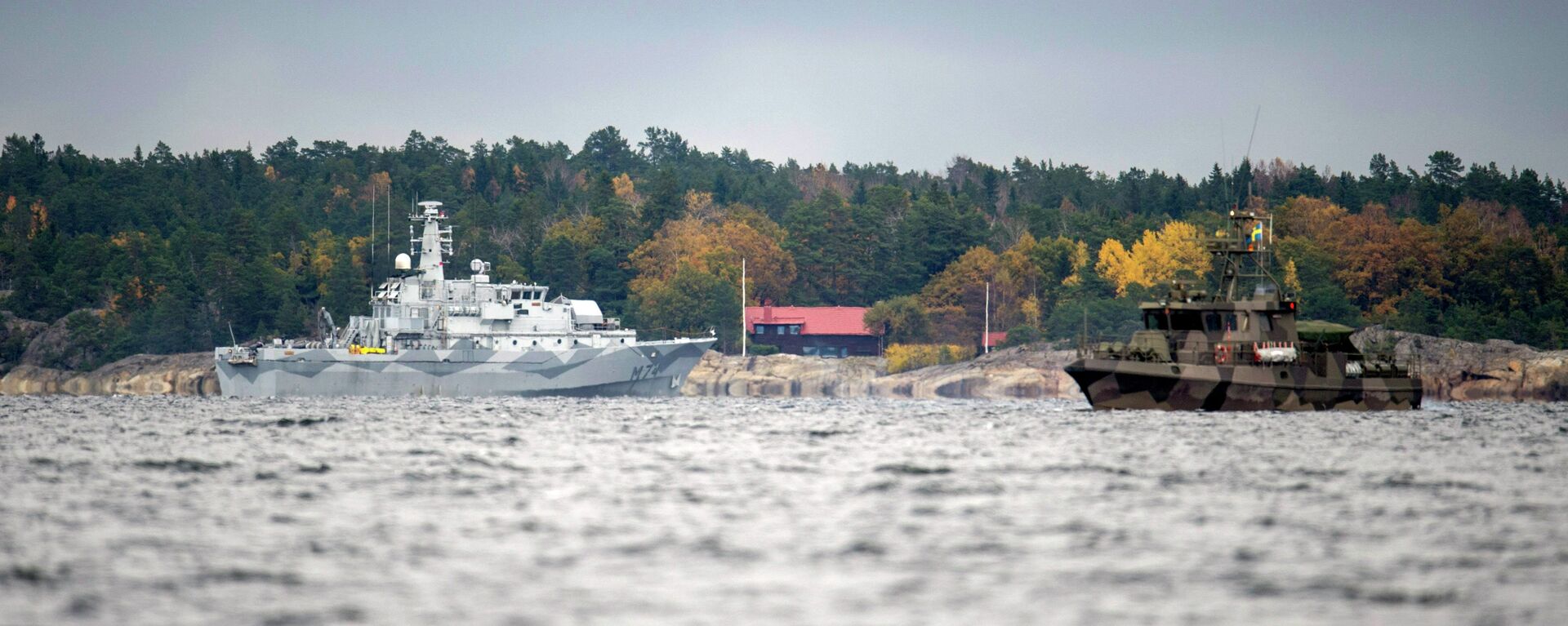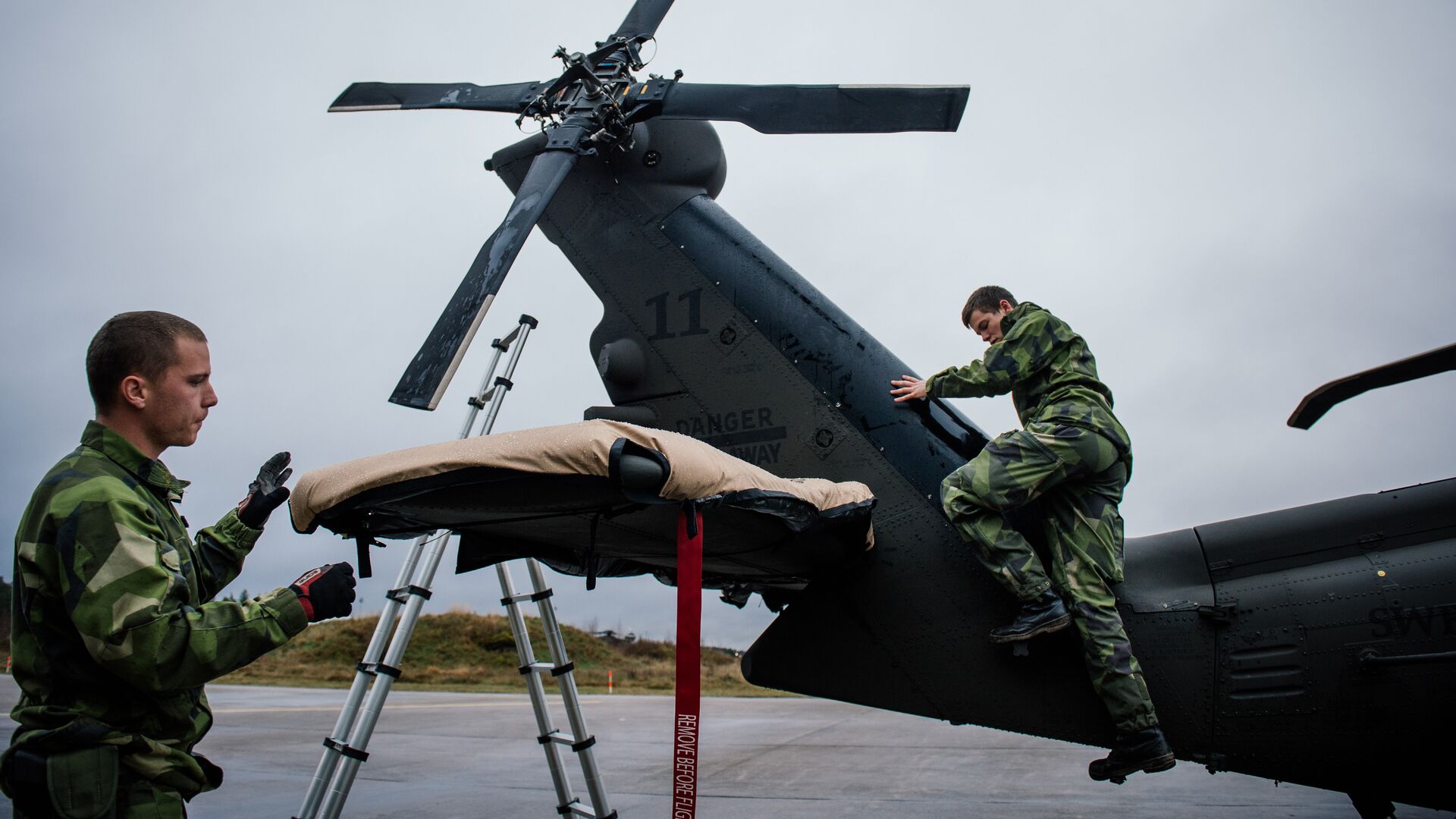https://sputnikglobe.com/20210920/sweden-raises-taxes-to-finance-largest-military-investment-in-modern-times-1089225492.html
Sweden Raises Taxes to Finance Largest Military Investment in Modern Times
Sweden Raises Taxes to Finance Largest Military Investment in Modern Times
Sputnik International
The build-up, which at the current stage includes new dragoon, amphibious and artillery regiments spanning across the country, implies a 40-percent hike in... 20.09.2021, Sputnik International
2021-09-20T06:12+0000
2021-09-20T06:12+0000
2021-09-20T06:13+0000
armed forces
newsfeed
military & intelligence
europe
sweden
https://cdn1.img.sputnikglobe.com/img/103919/69/1039196997_0:444:4809:3149_1920x0_80_0_0_783be30a0f95c428c13e098764cf94b1.jpg
The Swedish government has presented a massive tax hike programme aimed at financing a new expansion of the military, which at the current stage includes five new regiments and a new air flotilla.This expansion, of which the ongoing buildup is part of, has been billed as Sweden's largest investment in modern times, implying a 40-percent hike in military expenditures. To partially finance it, the Swedish government has announced new tobacco and alcohol taxes as well as stricter taxes on dividends to foreign shareholders. The forthcoming proposals are expected to increase tax revenues by around SEK 1.25 billion ($140 million) annually from 2024.The expansion of the Armed Forces has been commissioned by the parliament and the government in order to strengthen Sweden's defence capability in the light of “uncertain and unstable development” in the world and immediate surroundings.The units that are now being established are part of a larger military buildup that will gradually continue throughout the 2020s.Among others, the expansion includes dragoon regiments and amphibious regiments, which will be responsible for defending territory ranging from the northernmost Norrland county in the north to Gothenburg and Uppsala in the south. Preparations are also in full swing for the establishment of an artillery regiment in the Bergslagen region, even though no opening date has been set yet. Despite the upcoming inauguration ceremonies, the units are currently at different stages of preparedness. While some already have established garrisons with running military activity, others have yet to build premises and firing ranges.“We put a lot of effort into the establishment work and it is progressing steadily. For the majority of the units, we are significantly ahead of the time limit given by the Armed Forces by the government and there is nothing, right now, to suggest that we will not be able to realise all the new units in time”, Svensson said, emphasising a “great interest” from the public for the vacancies that the Armed Forces advertise.In recent years, Sweden's establishment, including politicians, top brass (including Defence Minister Hultqvist) and leading journalists, have repeatedly used the “assertive” and “aggressive” Russia narrative as a pretext for assuring military allocations and reinforcements, including the recent re-militarisation of the once-demilitarised Baltic island of Gotland, which was previously identified as a possible entry point and “springboard” for a Russian “invasion”.Russia, in return, said that changes in Swedish military spending “cannot but cause concern”. Russian Foreign Ministry spokeswoman Maria Zakharova suggested that “trumped-up anti-Russian phobias” are largely a result of external pressure on Stockholm, primarily from NATO, to which Sweden is moving closer, despite formally retaining its non-aligned status. Russia's last war with Sweden concluded just over 212 years ago, on 17 September 1809.
https://sputnikglobe.com/20210915/us-marines-hold-combat-drills-in-stockholm-archipelago-1089083637.html
sweden
Sputnik International
feedback@sputniknews.com
+74956456601
MIA „Rosiya Segodnya“
2021
News
en_EN
Sputnik International
feedback@sputniknews.com
+74956456601
MIA „Rosiya Segodnya“
Sputnik International
feedback@sputniknews.com
+74956456601
MIA „Rosiya Segodnya“
armed forces, newsfeed, military & intelligence, europe, sweden
armed forces, newsfeed, military & intelligence, europe, sweden
Sweden Raises Taxes to Finance Largest Military Investment in Modern Times
06:12 GMT 20.09.2021 (Updated: 06:13 GMT 20.09.2021) The build-up, which at the current stage includes new dragoon, amphibious and artillery regiments spanning across the country, implies a 40-percent hike in military expenditures. To partially finance it, the Swedish government has announced new tobacco and alcohol taxes as well as stricter taxes on foreign shareholders' dividends.
The Swedish government has presented a massive tax hike programme aimed at financing a new expansion of the military, which at the current stage includes five new regiments and a new air flotilla.
This expansion, of which the ongoing buildup is part of, has been billed as Sweden's largest investment in modern times, implying a 40-percent hike in military expenditures. To partially finance it, the Swedish government has announced new tobacco and alcohol taxes as well as stricter taxes on dividends to foreign shareholders. The forthcoming proposals are expected to increase tax revenues by around SEK 1.25 billion ($140 million) annually from 2024.
“Continuing to strengthen the military in accordance with the current plans is a priority,” Defence Minister Peter Hultqvist said in a statement.
The expansion of the Armed Forces has been commissioned by the parliament and the government in order to strengthen Sweden's defence capability in the light of “uncertain and unstable development” in the world and immediate surroundings.
The units that are now being established are part of a larger military buildup that will gradually continue throughout the 2020s.
“The new regiments and air flotilla will contribute to a more sustainable organisation, we will train more conscripts and not least have a geographical presence in strategically important areas”, Swedish Armed Forces production manager Johan Svensson
said in the statement.
Among others, the expansion includes dragoon regiments and amphibious regiments, which will be responsible for defending territory ranging from the northernmost Norrland county in the north to Gothenburg and Uppsala in the south. Preparations are also in full swing for the establishment of an artillery regiment in the Bergslagen region, even though no opening date has been set yet. Despite the upcoming inauguration ceremonies, the units are currently at different stages of preparedness. While some already have established garrisons with running military activity, others have yet to build premises and firing ranges.
“We put a lot of effort into the establishment work and it is progressing steadily. For the majority of the units, we are significantly ahead of the time limit given by the Armed Forces by the government and there is nothing, right now, to suggest that we will not be able to realise all the new units in time”, Svensson said, emphasising a “great interest” from the public for the vacancies that the Armed Forces advertise.
In recent years, Sweden's establishment, including politicians, top brass (including Defence Minister Hultqvist) and leading journalists, have repeatedly used the “assertive” and “aggressive” Russia narrative as a pretext for assuring military allocations and reinforcements, including the recent
re-militarisation of the once-demilitarised Baltic island of Gotland, which was previously identified as a possible entry point and “springboard” for a Russian “invasion”.

15 September 2021, 05:41 GMT
Russia, in return, said that changes in Swedish military spending “cannot but cause concern”. Russian Foreign Ministry spokeswoman Maria Zakharova suggested that “trumped-up anti-Russian phobias” are largely a result of external pressure on Stockholm, primarily from NATO, to which Sweden is
moving closer, despite formally retaining its non-aligned status. Russia's last war with Sweden concluded just over 212 years ago, on 17 September 1809.




